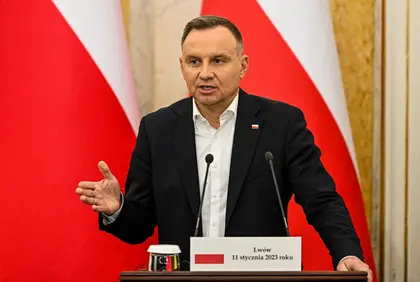Poland's president on Monday, May 29, greenlighted a commission of inquiry into "Russian influence in Poland", a controversial new body that critics say turns politicians into judges.
Poland -- a neighbur and staunch ally of Ukraine, which is battling a Russian invasion -- has introduced the commission just months before parliamentary elections.
JOIN US ON TELEGRAM
Follow our coverage of the war on the @Kyivpost_official.
The move has been condemned by the opposition and many legal experts as a "constitutional coup d'etat".
The commission's nine members, appointed by the lower house of parliament, will decide if individuals it investigates succumbed to Russian influence between 2007 and 2022 and impose harsh penalties.
"I hope the parliament will choose responsibly when it comes to the members of the commission," President Andrzej Duda said in a televised statement.
The head of state, who is allied with the ruling nationalist Law and Justice (PiS) party, also said he would ask the prime minister to propose an equivalent commission at the EU level to the European Council.
The government has not provided for any appeal process for people found guilty, who could find themselves banned for 10 years from public positions relating to public finances and classified information.
The stated aim is to prevent such individuals "from again operating under Russian influence, to the detriment of Poland's interests".
Critics say the commission undermines the separation of powers -- the principle that legislative and judicial bodies are separate and independent of each other.

Russia Gave N. Korea Oil, Anti-Air Missiles in Exchange for Troops: Officials
In effect, the commission's politically appointed members are both prosecutors and judges in the cases they will handle.
The entire opposition -- left, center and extreme right -- is refusing to take part in the commission.
It says the body is designed to shackle PiS adversaries ahead of the parliamentary elections and prevent opposition figures taking up their posts if they win the vote.
Marcin Kierwinski, a lawmaker from the main opposition party Civic Platform (PO), slammed the commission as "Stalinist" while centrist politician Szymon Holownia called it "the end of democracy".
Critics also argue that the commission is meant to distract from media allegations against the PiS, which is close to European politicians suspected of ties to Russia, including French far-right leader Marine Le Pen.
The bill to create the commission was rejected in early May by the opposition-controlled Senate but pushed through the populist-controlled lower house on second reading on Friday.
Senators condemned the move as a "witch hunt" and said the commission would be a "puppet court".
The head of the body will be appointed by Prime Minister Mateusz Morawiecki. Its members will not be held accountable for their decisions.
You can also highlight the text and press Ctrl + Enter






